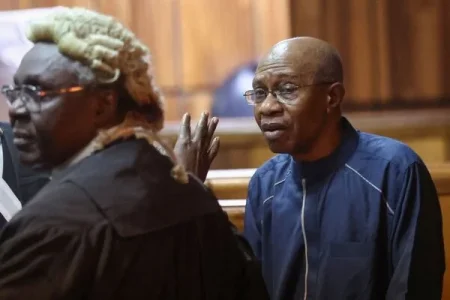
A Lagos federal court orders the final forfeiture of N12.18 billion worth of properties linked to former CBN Governor Godwin Emefiele. The EFCC-led case resulted in the transfer of assets to the Nigerian government. This ruling marks a significant step in anti-corruption efforts and legal proceedings against Emefiele.
A federal high court in Lagos has ordered the final forfeiture of properties worth N12.18 billion linked to Godwin Emefiele, the former governor of the Central Bank of Nigeria (CBN). This ruling marks a crucial step in the legal proceedings against Emefiele, who faces multiple counts of fraud and abuse of office.
Judge Chukwujekwu Aneke's decision follows an earlier interim forfeiture order issued on June 5. The Economic and Financial Crimes Commission (EFCC) filed a motion for the final forfeiture, which the court has now granted. The properties in question, located in upscale areas of the Federal Capital Territory, were listed by the EFCC in two schedules, A and B.
The court's order stipulated that the anti-graft agency publish the forfeiture notice in a national newspaper, allowing any interested parties to contest the decision. However, with the final ruling, these high-value assets will now be transferred to the Federal Government of Nigeria.
Judge Aneke stated that the properties in both schedules were "traced and reasonably suspected to have been acquired with proceeds of unlawful activities." This ruling underscores the severity of the allegations against Emefiele and the government's commitment to recovering assets believed to be illegally acquired.
The case against the former CBN governor has drawn significant public attention, highlighting issues of accountability in Nigeria's financial sector. As the legal proceedings continue, this forfeiture order represents a tangible outcome in the broader context of anti-corruption efforts in the country.
The implications of this case extend beyond Emefiele himself, potentially impacting public trust in financial institutions and serving as a deterrent to corruption in high offices.




